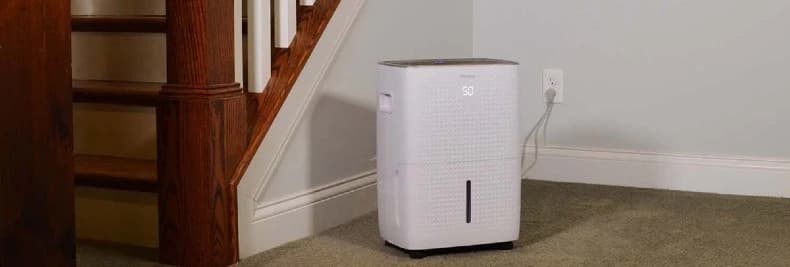Dehumidifiers and humidifiers, their names sound similar, but they're not the same appliances. One adds moisture to your indoor air, while the other helps to remove moisture. What's the difference, and which one is right for you?
View a video comparing dehumidifiers and humidifiers
- What does a dehumidifier do?
- When should you use a dehumidifier?
- Where should you use a dehumidifier?
- What does a humidifier do?
- When should you use a humidifier?
- Where's the best place to put a humidifier?
- Do I need a humidifier or dehumidifier in winter?
- Can a dehumidifier work as a humidifier?
What Does A Dehumidifier Do?
 A dehumidifier lowers your home's indoor humidity level by removing excess moisture. Dehumidifiers remove moisture from the air in your home by:
A dehumidifier lowers your home's indoor humidity level by removing excess moisture. Dehumidifiers remove moisture from the air in your home by:
- Pulling the damp air into the dehumidifier.
- Cooling the air with a condenser to remove the moisture from the air.
- Moisture that's removed from the air collects inside of a water tank in the dehumidifier, or drains from the unit in some models.
- The now dry, dehumidified air is released back into your space by the dehumidifier's fan.
When Should You Use A Dehumidifier?
Dehumidifiers are used when indoor humidity levels are too high. Common symptoms of high indoor humidity include:
- Mold and musty scents
- Warm, humid, and uncomfortable conditions
- Evidence of mold or mildew on walls or around edges of floors/ceilings
- Uneven floor boards or structural damage
See If You Need A Dehumidifier
Where Should You Use A Dehumidifier?
Dehumidifiers are versatile moisture removal solutions for almost any room in your home. Common areas where dehumidifiers are used include:
- Basements
- Crawl spaces
- Kitchens, bathrooms, and laundry rooms
- Bedrooms
- Garages and workshops
- Spa and indoor pool areas
Learn Everywhere That Dehumidifiers Can Be Used
What Does A Humidifier Do?
 Humidifiers work to raise the humidity level in your space, unlike dehumidifiers that work to lower it. Humidifiers help to alleviate uncomfortable effects of dry air by:
Humidifiers work to raise the humidity level in your space, unlike dehumidifiers that work to lower it. Humidifiers help to alleviate uncomfortable effects of dry air by:
- Humidifiers feature a reservoir that holds water. As needed, water is dispensed from the reservoir into a basin.
- The humidifier may use a wicking filter or just the unit's fan to absorb water from the basin.
- After the water has been absorbed, the newly humidified air is then released into your air by the humidifier's fan to help raise your indoor humidity level.
When Should You Use A Humidifier?
Humidifiers should be used when the relative humidity level of your indoor air is too low. Frequent indicators of low indoor humidity levels are:
- Dry Sinus Passages
- Bloody Noses
- Cracked Lips
- Sore, Scratchy Throat
- Dry, Scaly Skin
Find Out More About Who Needs A Humidifier
Where's The Best Place To Put A Humidifier?
Standalone humidifiers plug into an electrical outlet and are typically placed on bedside tables, desks, and other spaces for humidifying single rooms. Larger console humidifiers may be placed on the floor.
HVAC/ducted humidifiers install directly onto your home's heating and cooling system. They use your home's existing ductwork to disperse moisture throughout your entire home.
Read About The Types Of Humidifiers
Do I Need A Humidifier Or Dehumidifier In Winter?
Cold winter air is dry. As the cold air enters your home, it dries out your indoor air. You'll want to use a humidifier to help raise the moisture level of your home's indoor air quality.
Can A Dehumidifier Work As A Humidifier?
Dehumidifiers do the opposite of humidifiers, lowering the humidity level instead of raising it. A dehumidifier cannot work as a humidifier.
Video
{{ wistiaembed('whfs7u76yj') }}In Summary
Dehumidifiers and humidifiers are two totally different appliances. Dehumidifiers remove moisture from the air, helping to prevent mold growth and protect your flooring and belongings from damage. For more information, visit our Dehumidifier Knowledge Center.
Humidifiers are used to add moisture to dry air, usually during winter. They eliminate symptoms like irritated nasal passages, dry sinuses, and itchy skin, making they're great for use in nurseries, when you're sick, and for relieving allergies. For additional information, visit our Humidifier Knowledge Center.
Still Have Questions?
Not sure what's best for you? We can take the guesswork out of decision-making. Call us at 1-800-934-9194. We want to help make your indoors healthy and comfortable.


